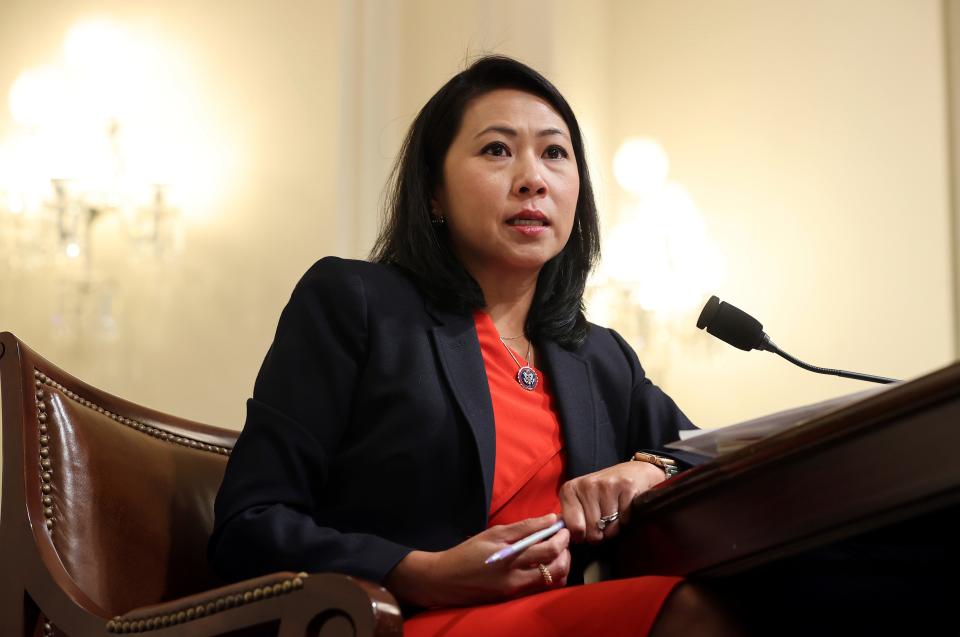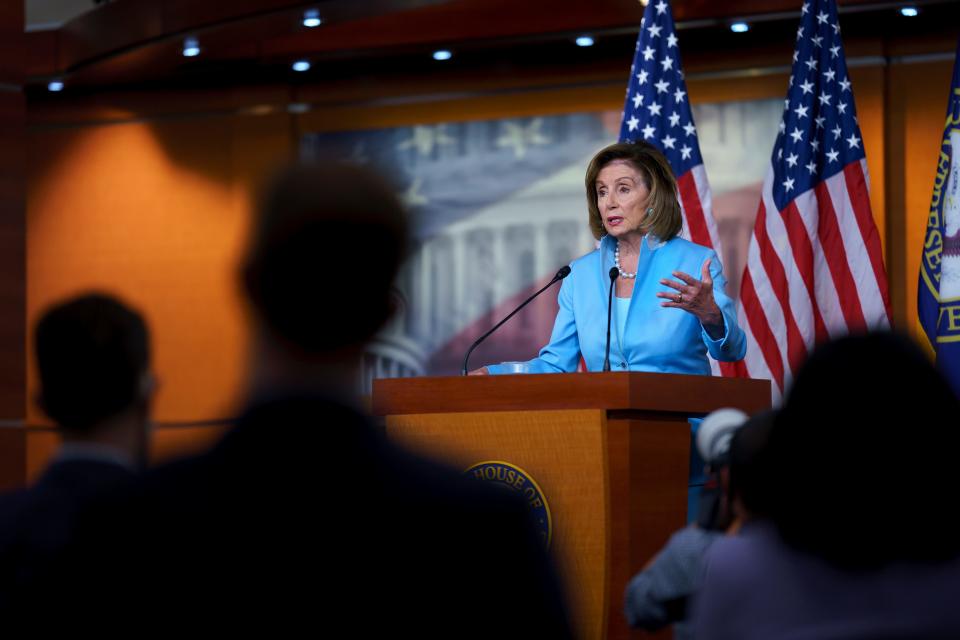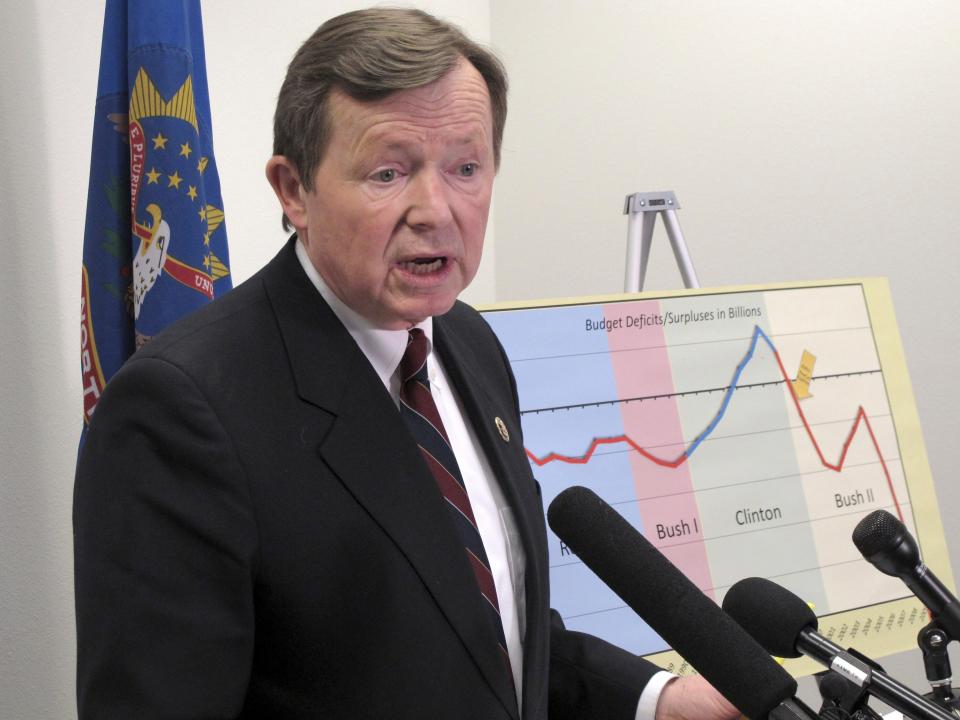History shows why moderate Democrats may be hesitant about Biden's agenda as 2022 elections loom

WASHINGTON – Rep. Baron Hill, D-Ind., faced a couple of tough votes in 2009 that explain why moderate House members are leery of supporting contentious legislation that faces an uncertain future in the Senate.
Hill supported energy legislation that aimed to cap greenhouse gas emissions under a market-based policy called “cap and trade.” The vote proved a bitter pill because the Senate never voted on the bill.
After that experience, Hill was more reluctant to support the Affordable Care Act a few months later because he was skeptical about the Senate again. He eventually went along, to expand access to health care.
But he lost his seat in 2010 – and he's still sore about the cap-and-trade vote.
“I’m still kind of upset about it because we were assured by our leadership that they would get the job done in the Senate,” Hill told USA TODAY. “That was a tough vote.”
His experience illustrated how House leaders of both parties sometimes ask rank-and-file members to take tough votes that could cost them their seats. Such requests are even harder to swallow when the Senate might not vote on a bill at all.
The dynamic is playing out again this year on President Joe Biden’s $3.5 trillion program of domestic priorities. Republicans vowed to oppose it. Moderate House Democrats are wary of supporting such a massive package of taxing and spending unless there is some assurance that the Senate will approve it.
“Voting for a tax hike that doesn't become law is the worst of all political worlds,” said John Pitney, a political science professor at Claremont McKenna College. “One could write a whole book about this situation and title it ‘Profiles in Futility.’”
The push-and-pull over the bill is playing out before the 2022 midterm elections in which Republicans hope to regain majorities in the House and Senate.
What is Congress doing? Deadlines loom for votes on government funding, debt limit and infrastructure
Richard Bensel, a government professor at Cornell University, said liberals are eager for their moment in the sun before potentially losing control of Congress next year. But the lawmakers most at risk of losing their seats are the same moderates being asked to vote for contentious legislation that might be trimmed or not pass at all.
“I think their fear is quite legitimate," Bensel said. “What they’re doing is really a quite brutal kind of calculus. How can you encourage people to walk the plank if you’re assuming they’re going to drown anyway?”
House Speaker Nancy Pelosi, D-Calif., Senate Majority Leader Chuck Schumer, D-N.Y., and President Joe Biden have insisted some version of the agenda will be approved. Pelosi promised colleagues Monday that House and Senate leaders are coordinating the legislation to yield something both chambers can send to Biden.
“I have promised members that we would not have House members vote for a bill with a higher topline than would be passed by the Senate,” Pelosi said, referring to the bill's $3.5 trillion price tag.

The National Republican Congressional Committee, the party’s campaign organization in the House, sent doormats to vulnerable Democrats supporting the legislation.
“We’re sending doormats to these lawmakers to remind them they let Nancy Pelosi walk all over them,” said Rep. Tom Emmer, R-Minn., who heads the group.
Nobody wants to take a controversial vote on futile legislation. Lawmakers coined a phrase for the phenomenon after 1993 legislation aimed to create a controversial tax on energy based on British thermal units. House members who risked voting in favor of the bill, which Senate Democrats dropped without a vote, called the experience “getting BTU’d.”
“BTU has become a verb. It’s a vote that really doesn’t mean anything,” said Earl Pomeroy, a former Democratic representative from North Dakota who is a senior counsel at the law firm Alston & Bird.
Pomeroy avoided becoming one of the 53 Democrats who lost House seats – and handed Republicans control of the chamber – in 1994 for a variety of reasons, including the BTU vote.
The vote on cap and trade preceded the House flip from Democratic to Republican control in the 2010 election.
Pomeroy, who represented a coal-producing state, voted against cap and trade. He was still stung in the next campaign by negative advertising that lumped him with Democratic supporters.
"I voted against it, but I got blamed for it in the 2010 election anyway because they were still so mad at us," said Pomeroy, who called a vote for cap and trade a more significant political cudgel than the BTU vote. "A number of freshmen in the industrial belt really paid a price on that vote."
The leadership strategy – and pain – occur on both sides of the aisle. Republican House leaders forced a vote in 2011 to privatize Medicare as part of the budget, which the Senate refused to consider.

Skepticism about the Senate comes up repeatedly in debate over Biden’s $3.5 trillion agenda. Democratic Sens. Joe Manchin of West Virginia and Kyrsten Sinema of Arizona have opposed that price tag without specifying how much they would accept.
Rep. Stephanie Murphy, D-Fla., said lawmakers can’t have everything they want when she voted against the Ways and Means Committee’s portion of the package governing taxes and other issues. She and Reps. Ed Case, D-Hawaii, and Jim Costa, D-Calif., said they want to see what the Senate will accept before voting on the House floor.
“Maybe the Senate has different priorities that we need to work through,” Case said Sept. 2 in a voting session of the Natural Resources Committee.
Arizona recount: enate leaders confirm Biden win (again)
The House Budget Committee chairman, Rep. John Yarmuth, D-Ky., acknowledged the key is negotiating legislation the Senate will approve. He noted that Pelosi can be very persuasive.
“I've been herding cats now for four months or so,” Yarmuth said. He urged lawmakers to “posture all you want” and “fight for what you believe in,” but he predicted Democrats would eventually support the legislation because it contains funding for child care, paid family leave and other popular programs.
“And by the way, have you met Nancy?” Yarmuth said he asks wavering lawmakers.
Pomeroy lost his 18-year seat after supporting the Affordable Care Act. Because the House voted first on the measure in November 2009, he said, he faced $3.5 million in negative ads in the first two months after the vote, against his own $250,000. He said the insurance industry used him as a proxy to bludgeon North Dakota’s Democratic Sens. Kent Conrad and Byron Dorgan, who also supported the bill.
“I was so out-shouted, it didn’t even matter. I was spitting in the wind,” Pomeroy said. “When it ended, it ended with a thud.”
Hill also faced fierce opposition. He recalled town halls in New Albany and Bloomington during the health care debate, when 1,000 people would show up rather than the typical 25. Audience members hated the bill even after learning it was filled with provisions they liked, he said, such as eliminating preconditions as a reason for denying insurance.
“I kept a diary during that whole debate, and I wrote in it several times, ‘This may cost me the election,’” Hill said. "It was the right thing to do."
Hill and Pomeroy said the success of health care legislation salved their wounds.
“Nobody said that this was an easy business,” Hill said.
This article originally appeared on USA TODAY: 2022 elections: Some Democrats hope to avoid futile vote on Biden bill

 Yahoo Movies
Yahoo Movies 
